人教版九年级全册Unit 2 I think that mooncakes are delicious! 知识点总结(含短语 句型 精讲 作文)
文档属性
| 名称 | 人教版九年级全册Unit 2 I think that mooncakes are delicious! 知识点总结(含短语 句型 精讲 作文) |
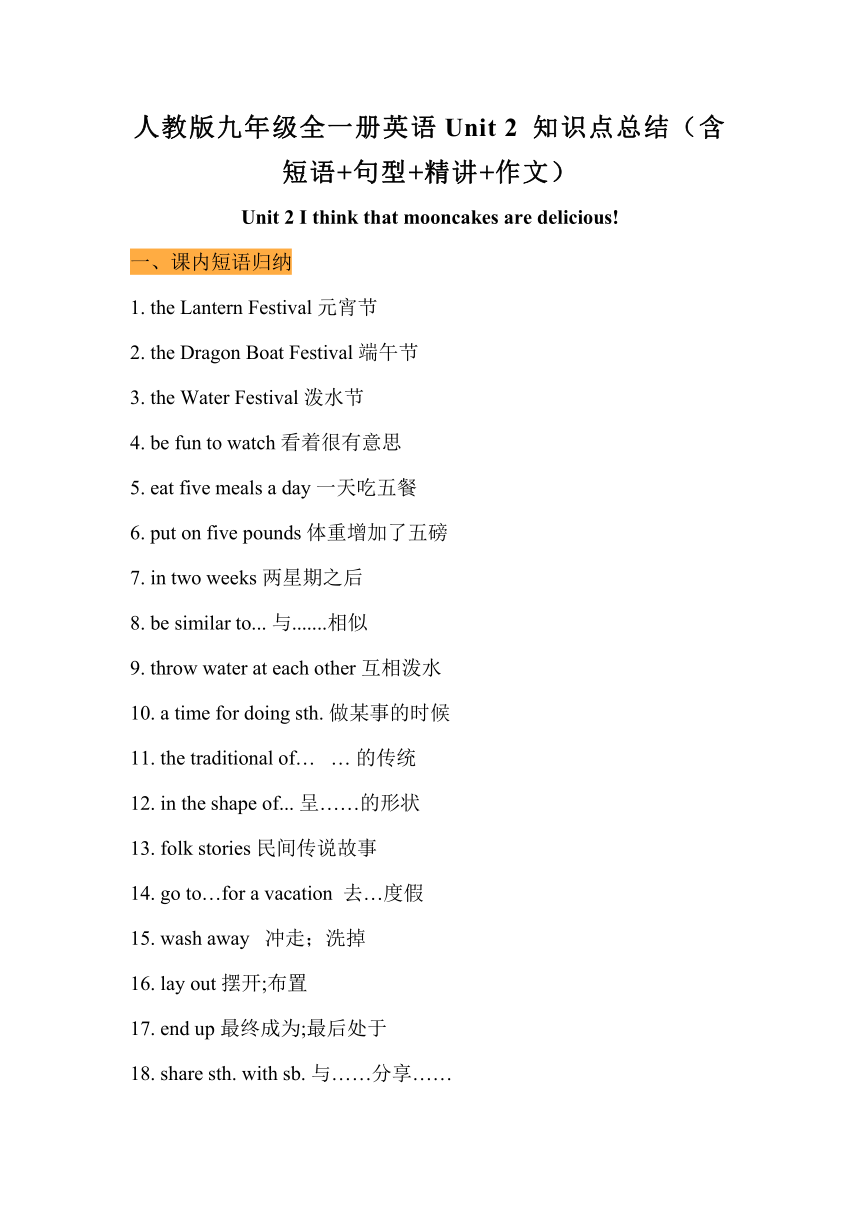
|
|
| 格式 | docx | ||
| 文件大小 | 29.7KB | ||
| 资源类型 | 教案 | ||
| 版本资源 | 人教新目标(Go for it)版 | ||
| 科目 | 英语 | ||
| 更新时间 | 2024-10-05 00:00:00 | ||
图片预览

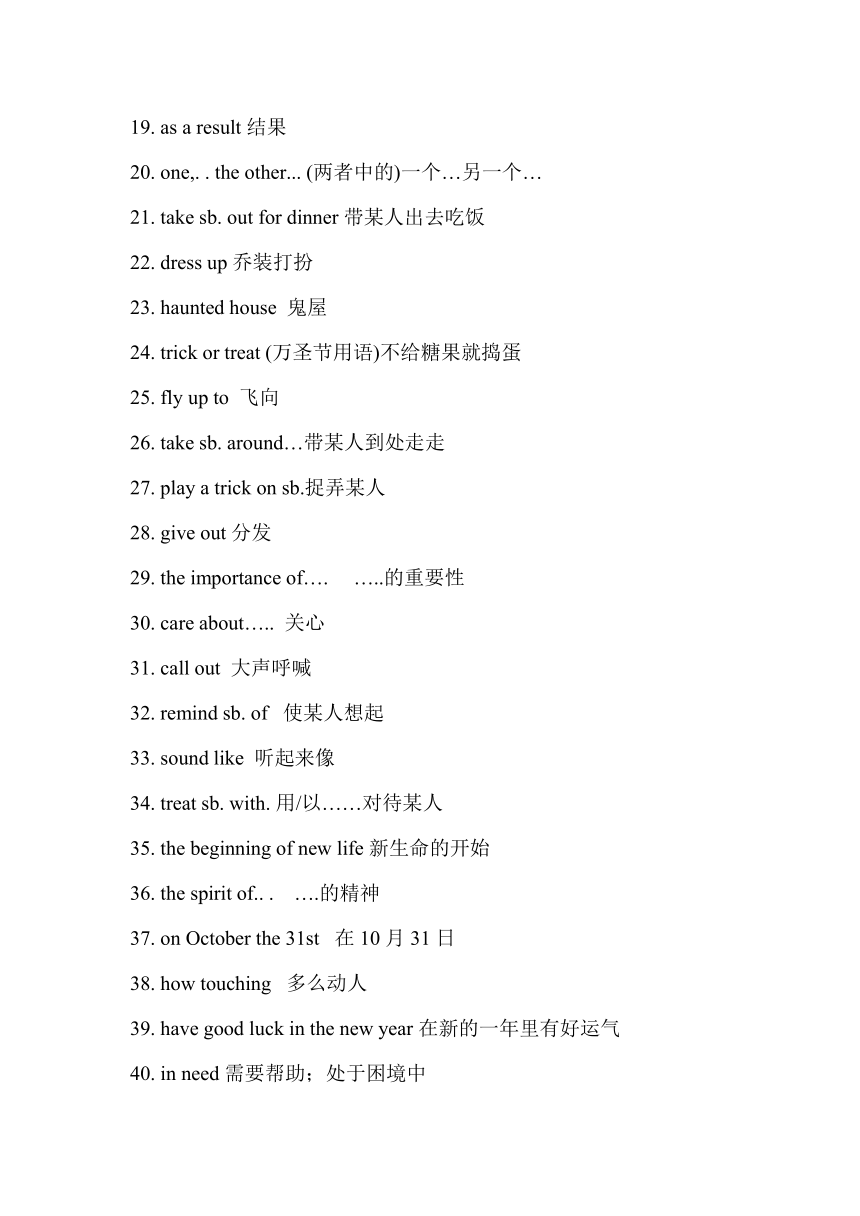
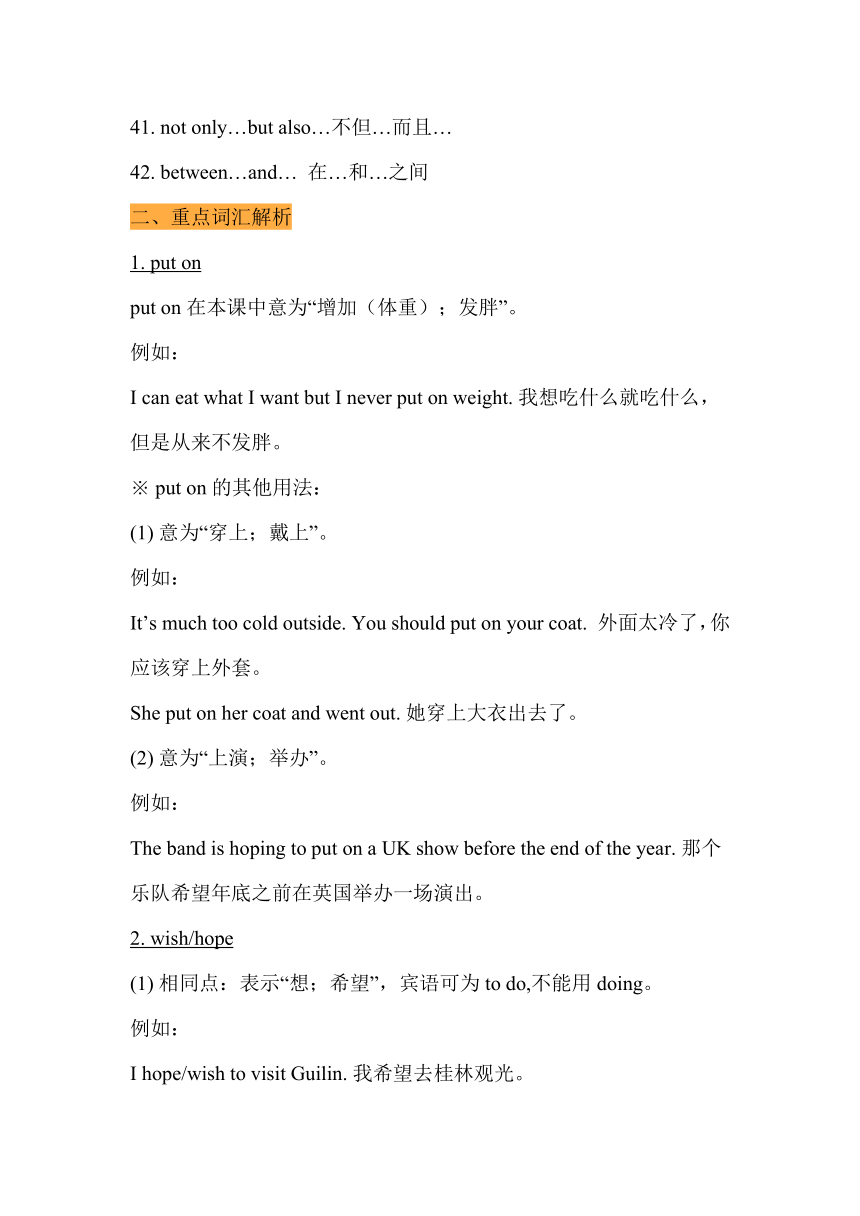
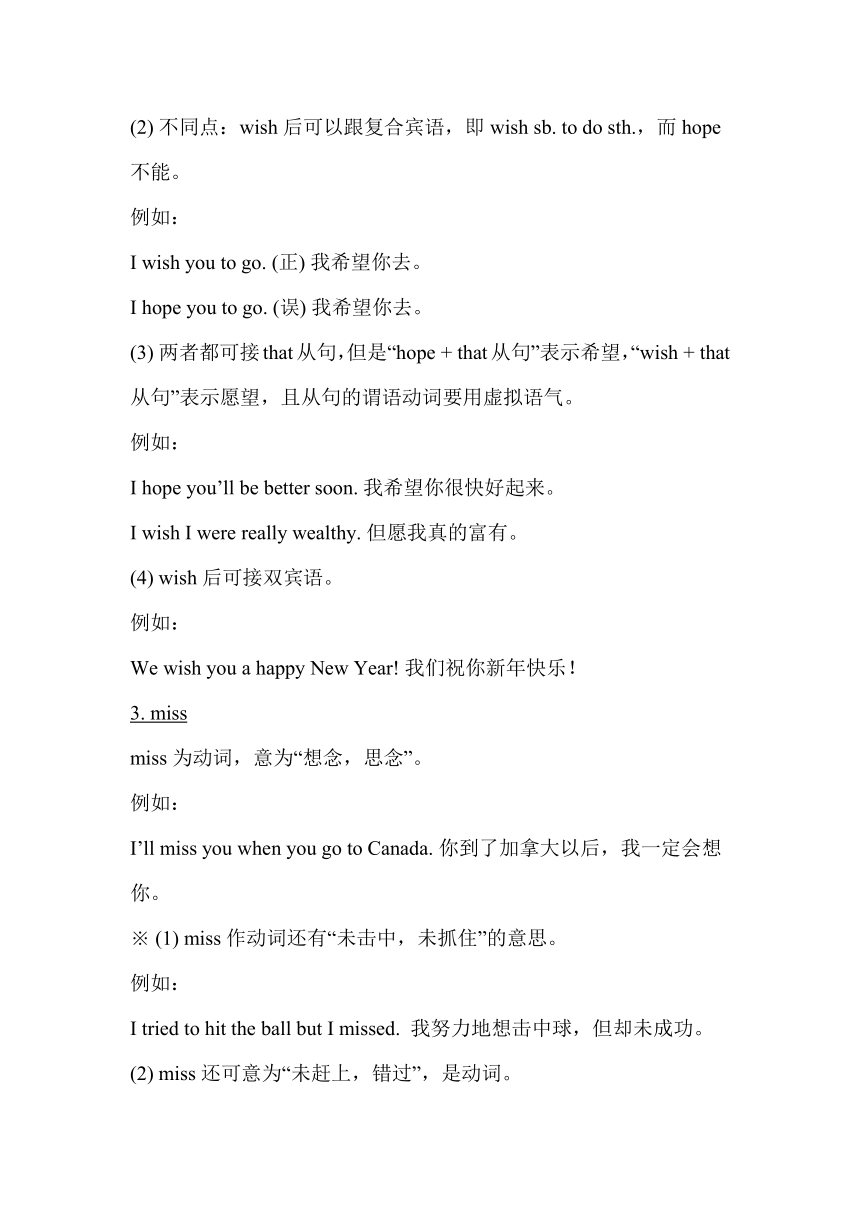
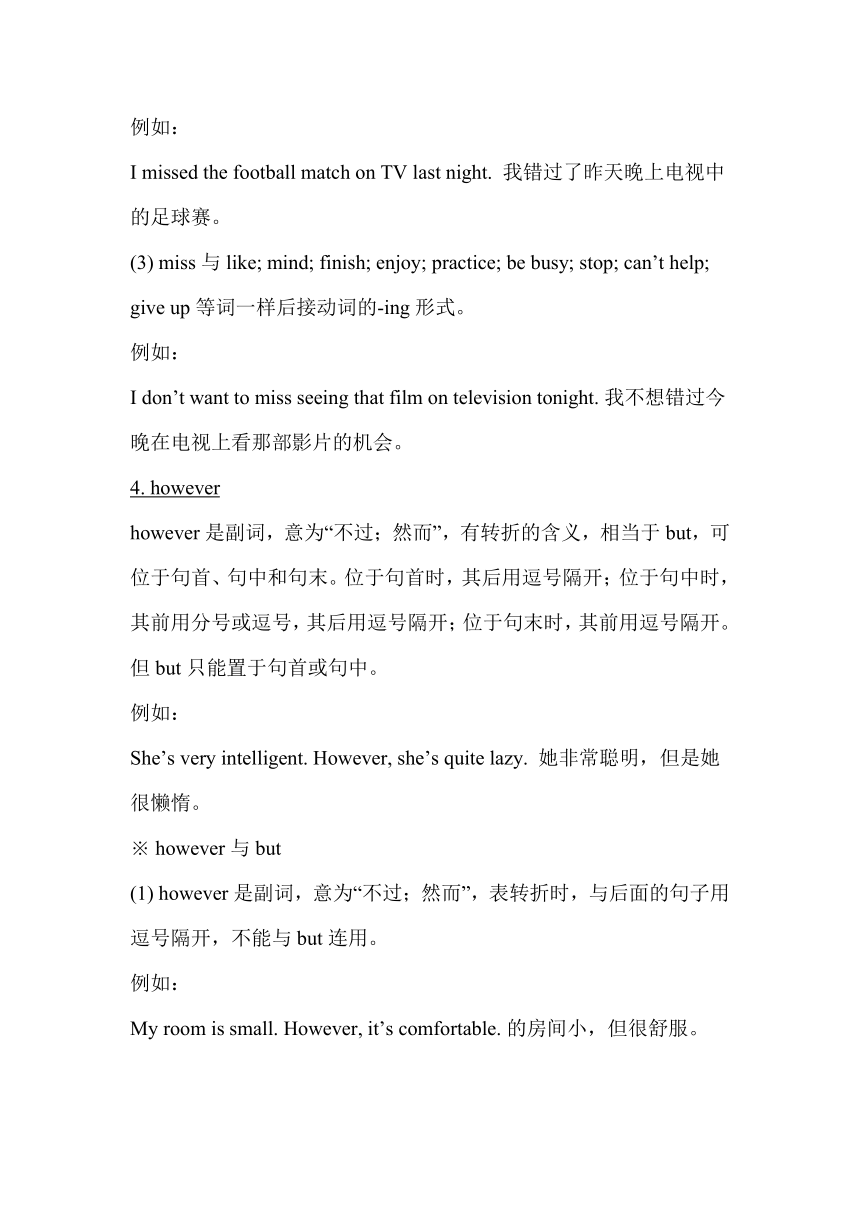
文档简介
人教版九年级全一册英语Unit 2 知识点总结(含短语+句型+精讲+作文)
Unit 2 I think that mooncakes are delicious!
一、课内短语归纳
1. the Lantern Festival 元宵节
2. the Dragon Boat Festival 端午节
3. the Water Festival 泼水节
4. be fun to watch 看着很有意思
5. eat five meals a day 一天吃五餐
6. put on five pounds 体重增加了五磅
7. in two weeks 两星期之后
8. be similar to... 与.......相似
9. throw water at each other 互相泼水
10. a time for doing sth. 做某事的时候
11. the traditional of… … 的传统
12. in the shape of... 呈……的形状
13. folk stories 民间传说故事
14. go to…for a vacation 去…度假
15. wash away 冲走;洗掉
16. lay out摆开;布置
17. end up最终成为;最后处于
18. share sth. with sb. 与……分享……
19. as a result 结果
20. one,. . the other... (两者中的)一个…另一个…
21. take sb. out for dinner 带某人出去吃饭
22. dress up 乔装打扮
23. haunted house 鬼屋
24. trick or treat (万圣节用语)不给糖果就捣蛋
25. fly up to 飞向
26. take sb. around…带某人到处走走
27. play a trick on sb.捉弄某人
28. give out 分发
29. the importance of…. …..的重要性
30. care about….. 关心
31. call out 大声呼喊
32. remind sb. of 使某人想起
33. sound like 听起来像
34. treat sb. with. 用/以……对待某人
35. the beginning of new life 新生命的开始
36. the spirit of.. . ….的精神
37. on October the 31st 在10月31日
38. how touching 多么动人
39. have good luck in the new year在新的一年里有好运气
40. in need 需要帮助;处于困境中
41. not only…but also…不但…而且…
42. between…and… 在…和…之间
二、重点词汇解析
1. put on
put on在本课中意为“增加(体重);发胖”。
例如:
I can eat what I want but I never put on weight. 我想吃什么就吃什么,但是从来不发胖。
※ put on的其他用法:
(1) 意为“穿上;戴上”。
例如:
It’s much too cold outside. You should put on your coat. 外面太冷了,你应该穿上外套。
She put on her coat and went out. 她穿上大衣出去了。
(2) 意为“上演;举办”。
例如:
The band is hoping to put on a UK show before the end of the year. 那个乐队希望年底之前在英国举办一场演出。
2. wish/hope
(1) 相同点:表示“想;希望”,宾语可为to do,不能用doing。
例如:
I hope/wish to visit Guilin. 我希望去桂林观光。
(2) 不同点:wish后可以跟复合宾语,即wish sb. to do sth.,而hope不能。
例如:
I wish you to go. (正) 我希望你去。
I hope you to go. (误) 我希望你去。
(3) 两者都可接that从句,但是“hope + that从句”表示希望,“wish + that从句”表示愿望,且从句的谓语动词要用虚拟语气。
例如:
I hope you’ll be better soon. 我希望你很快好起来。
I wish I were really wealthy. 但愿我真的富有。
(4) wish后可接双宾语。
例如:
We wish you a happy New Year! 我们祝你新年快乐!
3. miss
miss为动词,意为“想念,思念”。
例如:
I’ll miss you when you go to Canada. 你到了加拿大以后,我一定会想你。
※ (1) miss作动词还有“未击中,未抓住”的意思。
例如:
I tried to hit the ball but I missed. 我努力地想击中球,但却未成功。
(2) miss还可意为“未赶上,错过”,是动词。
例如:
I missed the football match on TV last night. 我错过了昨天晚上电视中的足球赛。
(3) miss与like; mind; finish; enjoy; practice; be busy; stop; can’t help; give up等词一样后接动词的-ing形式。
例如:
I don’t want to miss seeing that film on television tonight. 我不想错过今晚在电视上看那部影片的机会。
4. however
however是副词,意为“不过;然而”,有转折的含义,相当于but,可位于句首、句中和句末。位于句首时,其后用逗号隔开;位于句中时,其前用分号或逗号,其后用逗号隔开;位于句末时,其前用逗号隔开。但but只能置于句首或句中。
例如:
She’s very intelligent. However, she’s quite lazy. 她非常聪明,但是她很懒惰。
※ however与but
(1) however是副词,意为“不过;然而”,表转折时,与后面的句子用逗号隔开,不能与but连用。
例如:
My room is small. However, it’s comfortable. 的房间小,但很舒服。
(2) but是连词,意为“但是”,表示转折时,与后面内容相连,不用逗号隔开。
例如:
She is young but very clever. 她虽然年轻但非常聪明。
5. dress up
dress up意为“装扮,乔装打扮”或者“穿上盛装,打扮”。
例如:
You don’t need dress up for the party. 你不必为这个聚会精心打扮。
※ dress up常与as;in连用构成短语
dress up as…意为“装扮成……;乔装打扮成……”;
dress up in…意为“穿上……”,后接表示衣服或颜色的名词。
例如:
He likes to dress up as a solider. 他喜欢装扮成军人。
On Christmas Day we always dress up in red. 在圣诞节我们总是穿上红衣服。
6. care about
care about意为“担心;关心;在乎;对……感兴趣”。
例如:
Don’t you care about losing your job 你难道不担心失去工作吗?
I really care about the students in my class. 我真的很关心我班的学生。
I don’t care about your opinion. 我对你的观点不感兴趣。
※ care about与care for的辨析:
(1) care about意为“关心;在乎;介意”,强调出于责任感而“关心;在乎”。
例如:
My parents care about my health. 我父母关心我的健康。
(2) care for可意为“照料;照顾”,与take care of同义;也可意为“喜欢”,多用于疑问句或否定句,其同义短语为be fond of。
例如:
Would you care for a cup of tea 你想喝杯茶吗?
He helped me care for my mother when I left. 我离开时,他帮我照顾我母亲。
7. remind
(1) remind是及物动词,意思是“提醒、使某人想起”,经常和介词of连用构成动词短语:remind somebody of somebody/something=remind somebody that+从句,意思是“使某人想起某事或者某人”。
例如:
Does that song remind you of your mother 那首歌使你想起你的妈妈吗?
(2) 动词短语remind somebody to do something的意思是“提醒某人做某事”。
例如:
Please remind me to return the books to the library. 请提醒我把这些书还给图书馆。
8. promise
promise是动词,意为“允诺,答应”。其用法归纳如下:
(1) 后接名词或代词作宾语,常可以带间接宾语,即构成promise sb. sth.
例如:
He promised me the book. 他答应给我这本书。
(2) promise to do sth. 意为“承诺/答应做某事”。
例如:
He promised to help us. 他答应要帮助我们。
(3) promise sb. (not) to do sth. 意为“承诺/答应某人(不)做某事”。
例如:
I promise you not to say that. 我答应你不说那件事。
(4) promise + that从句,意为“承诺……”。
例如:
He promised that he would come straight home. 他承诺他会直接回家。
三、必背经典句
1. I think that they’ re fun to watch. 我认为它们看着很有意思。
2. What do you like best about the Dragon Boat Festival 关于端午节,你最喜欢什么?
3.What a great day! 多么美好的一天!
4. I wonder if it’s similar to the Water Festival of the Dai people in Yunnan Province. 我想知道它是否与云南傣族的泼水节相似。
5. How fantastic the dragon boat teams were! 龙舟队多棒啊!
6. What an interesting book it is! 它是一本多么有趣的书啊!
四、语法精讲
宾语从句
宾语从句在复合句中作主句的宾语。三大考点:引导词、时态和语序。
语句格式:由连接词+ 主语+ 谓语构成;宾语从句要用陈述句语序。
1. 引导词
(1) 由陈述句充当宾语从句时,这个宾语从句由that 引导,在口语中that 可以省去。
例如:
I hear that she’s going to give you a call. 我听说他要给你打电话。
He says (that) he is at home. 他说他在家里。
(2) 由连接代词、连接副词(疑问词) who、whom、whose 、what、when、how、where等引导,表示特殊疑问意义。
例如:
Do you know what he wants to buy 你知道他想要买什么吗?
I don’t know whom you should depend on. 我不知道你该依靠谁.
He didn’t tell me when we should meet again. 他没有告诉我什么时候我们能再见面.
None of us knows where these new parts can be bought. 没有人知道这些的新的零件能在哪里买到.
(3) 由if , whether 引导表示一般疑问意义(带有是否、已否、对否等)
例如:
I don’t know if / whether Wei Hua likes fish. 我不知道韦华是否喜欢鱼。
He asked if / whether they needed any help. 他问他们是否需要帮助。
※ if 和 whether 引导宾语从句时,一般情况下可以互换,但要注意以下情况:
① 宾语从句移到句首时,用whether不用if.
例如:
Whether it is true or not , I can’t say. 那件事是否是真的,我不能说。
② 在介词后常用whether不用if。
例如:
It depends on whether you can do the work well. 那取决于你是否能做好这项工作。
③ 与不定式连用时,只能用whether.
例如:
He can’t decide whether to accept or refuse. 他不能决定是否接受还是拒绝。
④ 当与or not 连用时,if 或whether 均可,但or not 直接跟在连词后时,则只能用whether.
例如:
Let me know whether/if you can came or not. 告诉我你是否能来。
I don’t care whether or not he comes 我不关心他是否来。
2. 宾语从句的时态
(1)主句用一般现在时,从句可用任意时。
(2)主句用过去时,从句用过去某个时态(一般过去时、过去进行时、过去完成时)。
例如:
I said that it was time we were setting out. 我说是我们动身的时候了。
She said that they would visit their grandparents. 她说他们将拜访他们的祖父母。
She wanted to know if I had finished m homework. 她想要知道我是否已经完成了我的作业
(3)主句用过去时,从句是真理时,只用一般现在时。
例如:
He said that light travels faster than sound. 他说光比声音传播得快。
What 和How引导的感叹句
1. what 引导的感叹句的中心词是名词。该名词前常有形容词修饰,句中的主语和谓语一般可省去。句型结构为:What (+a/an)+形容词+名词(+主语+谓语)!
例如:
what a cold day (it is ) today ! 今天天气真冷啊!
What delicious food (it is)! 多好吃的食物啊!
※ 若中心词(名词)为单数可数名词,要用定冠词a/an而不用the ;若为复数或不可数名词,则不用定冠词。
2. how引导的感叹句中心词是形容词或副词。句型结构为:How +形容词/副词+主语+谓语!How +形容词+a/an+单数可数名词+主语+谓语!
例如:
How cold it is today ! 今天天气真冷啊!
How beautiful a girl she is ! 她是多么漂亮的一个女孩!
How happy the children are! 孩子们多开心啊!
3. 陈述句改为感叹句:
陈述句改为感叹句时,常用“一断二加三换位”的方法:
① “一断”即谓语动词后边断开,把句子分为两部分
例如:
She is|a beautiful girl. 她是一位美丽的姑娘。
He works|hard. 他工作努力。
② “二加”即如果第二部分的第一个词为形容词、副词,就加上how;如果是名词,就加what
例如:
she is|(what) a beautiful.
He works|(how) hard.
③ “三换位”即把第一部分与第二部分互换位置。
例如:
What a beautiful girl she is !
How hard he works!
五、重点句子讲解
1. I’m going to Chiang Mai in two weeks. 两周后我要去清迈。
(1)go , come , leave , start , fly等表示位置移动的动词,常用这些动词的现在进行时表示将来时。
例如:
Jim is going boating this afternoon. 吉姆今天下午要去划船。
Are they all coming tomorrow 他们明天都来吗?
(2)in two weeks 两周后,表示将来时间,常用how soon来对其提问。
例如:
——How soon will the dinner be ready 晚饭还有多长时间做好?
——In ten minutes. 十分钟后。
2. Wow, sounds like fun! 哇, 听起来很有趣!
(1)sound like 意为“听起来像”;其中like为介词。sound like后接动词时,要用动名词。
例如:
It sounds like a nice room. Can we take a look at it 听起来是间不错的房间。我们能看一下吗?
That sounds like a child crying 听起来好像是个孩子在哭。(后接动词)
3. I wonder if it’s similar to the Water Festival of the Dai people in Yunnan Province. 我想知道它是否类似于云南傣族的泼水节。
be similar to 与……相似。
例如:
His problem is similar to yours. 他的问题与你的相似。
4. Chinese people have been celebrating Mid-Autumn Festival and enjoying mooncakes for centuries. 中国人庆祝中秋节、吃月饼已经有几个世纪了。
enjoy常用作及物动词,意思是“喜欢;享受……的乐趣”。
① enjoy 后接名词或代词。
例如:
They are enjoying their dinner 他们在津津有味地吃饭。
② enjoy 后接动词-ing形式。
例如:
I enjoy listening to light music 我喜欢听轻音乐
③ enjoy后接反身代词oneself,构成固定搭配,意为“过得愉快,玩得高兴”;相当于have a good time.
例如:
Did you enjoy yourself at the party 你在聚会上玩得高兴吗?
5. Chang’e refused to give it to him and drank it all. 嫦娥拒绝把神药给他而把它全喝了。
refuse to do sth 拒绝做某事。
例如:
He refused to come to see me . 他拒绝来见我。
6. Hou Yi was so sad that he called out her name to the moon every night.后羿非常伤心,他每天晚上对着月亮大喊她的名字。
(1) so… that… 意为“如此……以致……”
例如:
She is so lucky that she always wins at cards. 她是如此好运以致打牌总是赢。
与 too… to … (太……而不能……)可以互换。 例如:
The box is so heavy that we can’t carry it.
= The box is too heavy for us to carry it.
这个盒子太重了我们带不走。
7. Marley used to be just like Scrooge , so he was punished after he died. 马利曾经就像斯克鲁奇一样,所以他死后被处罚。
(1)used to 意为“曾经;过去常常”;
例如:
There used to be an old house near the river. 从前在这条小河附近有一座旧房子。
I used to look on him as a friend. 我以前把他看作是朋友。
(2)just like 意为“正如;就像”;
例如:
That baby looks just like her father. 那婴儿看上去就像她父亲!
8. First , the Ghost of Christmas Past takes him back to his childhood and reminds Scrooge of his happier days as a child. 首先,“过去之灵”带斯克鲁奇回到了他的童年,使他想起了孩提时的快乐时光。
(1)take … back to … 意为“带……回到……”
例如:
The photo take me back to my childhood. 这张照片带我回到了我的童年。
(2)remind sb of sth 意为“使某人想起某事;提醒某人某事”。
例如:
I must remind you of your promise. 我必须提醒你答应过的事。
You remind me of your father when you say that. 你说这话时,使我想起了你的父亲。
(2) remind sb to do sth 意为“提醒某人做某事”。
例如:
I reminded him to go home before dark. 我提醒他在天黑之前回家。
9. This holiday is always on a Sunday between March 22nd and April 25th. 这个节日总是在3月22日至4月25日之间的一个周日。
(1)between … and … 意为“在……之间;在……中间”。
例如:
I’m usually free between Tuesday and Thursday. 我通常在星期二至星期四有空。
※ between 与 among
①among指三者或三者以上之间,其通常是一个表示笼统数量或具有复数意义的名词或代词。例如:
They hid themselves among the trees. 他们躲在树林中。
②between 主要指两者之间,其宾语往往是表示两者的名词或代词,或者是由and连接的两个人或物。例如:
There was a fight between the two boys. 这两个男孩子打过一次架。
③among 可用来表示一个比较的范围,常与最高级连用。例如:
She is the tallest among her classmates. 她是她的同学之中最高的。
10. Not only do people spread them around in different hiding places for an egg hunt , but they also give out these treats as gifts. 人们不仅会把鸡蛋分散地藏在不同的地方来玩寻蛋游戏,而且还会把它们作为礼物分发出去。
(1)not only …. but (also) 意为“不但……而且……”;是个并列连词;also可省略;连接两个并列对等的成分。
例如:
She not only plays well, but also writes music. 她不仅很会演奏,而且还会作曲。
(2)当not only… but also 连接两个主语时,谓语动词的数原则上与其临近的主语保持一致。
例如:
Not only you but also he is wrong. 不仅你而且他也错了。
(3)为了强调,可将not only置于句首,前一个分句常用倒装来表示强调,而but (also)后的分句仍用陈述语序。
例如:
Not only do they need clothes , but they are also short water. 他们不仅需要衣服,而且还缺水。
六、作文积累
本单元的写作话题是“节日”
典型例题:
1. 假设你是王涛,你的美国笔友(Peter)对中国文化很感兴趣,他写信向你询问中国的传统节日中秋节(the Mid-Autumn Festival)的习俗。请你根据下面的提示,写一封回信。
内容要点:
(1)When is it celebrated
(2)What do people usually do during the festival
(3)What do you think of the festival
要求:
(1)包括提示中所有要点,可适当发挥。
(2)语句通顺、语意连贯,文中不要出现真实的人名和校名。
(3)词数80左右(回信的开头与结尾已给出,不计入总词数)。
参考词汇:农历Chinese lunar calendar
范文:
Dear Peter,
I’m glad to hear from you. Now let me introduce the Mid-Autumn Festival to you. It falls on the 15th day of the 8th lunar month. It’s a big day for us Chinese people. All the family members get together to celebrate the festival. In the evening, we usually have a big dinner. And then we go outside and enjoy the full moon. The moon that night looks the brightest. With the beautiful moon up in the sky, we sit together, eat mooncakes, and share our stories. I think this festival is very meaningful. For me, the best part is to enjoy the moon and eat mooncakes. Mooncakes taste very delicious. They look like the moon, big and round.
Yours,
Wang Tao
2. 假如你是初二的学生李华,你们学校正在开展中国传统文化的社会实践课活动,你想向你校的英国交换生Peter介绍一下庆祝今年中秋节的计划。请用英文写一封电子邮件,告诉他你将和谁一起庆祝今年的中秋节,你们将如何庆祝。提示词语:celebrate (庆祝), mooncakes, solve riddles on lanterns, culture
提示问题:
(1) Who will you celebrate the Mid-Autumn Festival with
(2) What will you do during the festival
范文:
Dear Peter,
How is it going The Mid-Autumn Festival is an important festival in China and it will be on September 29th this year. In order to celebrate this festival, we will get together with all our family members. We will clean the house and have a big dinner. We will also eat mooncakes. They are delicious. What’s more, it’s very interesting to solve riddles on lanterns. On that day, the moon is round and bright, so it is good for us to enjoy it. Are you interested in it I really hope you can come and celebrate this festival with us.
Yours,
Li Hua
Unit 2 I think that mooncakes are delicious!
一、课内短语归纳
1. the Lantern Festival 元宵节
2. the Dragon Boat Festival 端午节
3. the Water Festival 泼水节
4. be fun to watch 看着很有意思
5. eat five meals a day 一天吃五餐
6. put on five pounds 体重增加了五磅
7. in two weeks 两星期之后
8. be similar to... 与.......相似
9. throw water at each other 互相泼水
10. a time for doing sth. 做某事的时候
11. the traditional of… … 的传统
12. in the shape of... 呈……的形状
13. folk stories 民间传说故事
14. go to…for a vacation 去…度假
15. wash away 冲走;洗掉
16. lay out摆开;布置
17. end up最终成为;最后处于
18. share sth. with sb. 与……分享……
19. as a result 结果
20. one,. . the other... (两者中的)一个…另一个…
21. take sb. out for dinner 带某人出去吃饭
22. dress up 乔装打扮
23. haunted house 鬼屋
24. trick or treat (万圣节用语)不给糖果就捣蛋
25. fly up to 飞向
26. take sb. around…带某人到处走走
27. play a trick on sb.捉弄某人
28. give out 分发
29. the importance of…. …..的重要性
30. care about….. 关心
31. call out 大声呼喊
32. remind sb. of 使某人想起
33. sound like 听起来像
34. treat sb. with. 用/以……对待某人
35. the beginning of new life 新生命的开始
36. the spirit of.. . ….的精神
37. on October the 31st 在10月31日
38. how touching 多么动人
39. have good luck in the new year在新的一年里有好运气
40. in need 需要帮助;处于困境中
41. not only…but also…不但…而且…
42. between…and… 在…和…之间
二、重点词汇解析
1. put on
put on在本课中意为“增加(体重);发胖”。
例如:
I can eat what I want but I never put on weight. 我想吃什么就吃什么,但是从来不发胖。
※ put on的其他用法:
(1) 意为“穿上;戴上”。
例如:
It’s much too cold outside. You should put on your coat. 外面太冷了,你应该穿上外套。
She put on her coat and went out. 她穿上大衣出去了。
(2) 意为“上演;举办”。
例如:
The band is hoping to put on a UK show before the end of the year. 那个乐队希望年底之前在英国举办一场演出。
2. wish/hope
(1) 相同点:表示“想;希望”,宾语可为to do,不能用doing。
例如:
I hope/wish to visit Guilin. 我希望去桂林观光。
(2) 不同点:wish后可以跟复合宾语,即wish sb. to do sth.,而hope不能。
例如:
I wish you to go. (正) 我希望你去。
I hope you to go. (误) 我希望你去。
(3) 两者都可接that从句,但是“hope + that从句”表示希望,“wish + that从句”表示愿望,且从句的谓语动词要用虚拟语气。
例如:
I hope you’ll be better soon. 我希望你很快好起来。
I wish I were really wealthy. 但愿我真的富有。
(4) wish后可接双宾语。
例如:
We wish you a happy New Year! 我们祝你新年快乐!
3. miss
miss为动词,意为“想念,思念”。
例如:
I’ll miss you when you go to Canada. 你到了加拿大以后,我一定会想你。
※ (1) miss作动词还有“未击中,未抓住”的意思。
例如:
I tried to hit the ball but I missed. 我努力地想击中球,但却未成功。
(2) miss还可意为“未赶上,错过”,是动词。
例如:
I missed the football match on TV last night. 我错过了昨天晚上电视中的足球赛。
(3) miss与like; mind; finish; enjoy; practice; be busy; stop; can’t help; give up等词一样后接动词的-ing形式。
例如:
I don’t want to miss seeing that film on television tonight. 我不想错过今晚在电视上看那部影片的机会。
4. however
however是副词,意为“不过;然而”,有转折的含义,相当于but,可位于句首、句中和句末。位于句首时,其后用逗号隔开;位于句中时,其前用分号或逗号,其后用逗号隔开;位于句末时,其前用逗号隔开。但but只能置于句首或句中。
例如:
She’s very intelligent. However, she’s quite lazy. 她非常聪明,但是她很懒惰。
※ however与but
(1) however是副词,意为“不过;然而”,表转折时,与后面的句子用逗号隔开,不能与but连用。
例如:
My room is small. However, it’s comfortable. 的房间小,但很舒服。
(2) but是连词,意为“但是”,表示转折时,与后面内容相连,不用逗号隔开。
例如:
She is young but very clever. 她虽然年轻但非常聪明。
5. dress up
dress up意为“装扮,乔装打扮”或者“穿上盛装,打扮”。
例如:
You don’t need dress up for the party. 你不必为这个聚会精心打扮。
※ dress up常与as;in连用构成短语
dress up as…意为“装扮成……;乔装打扮成……”;
dress up in…意为“穿上……”,后接表示衣服或颜色的名词。
例如:
He likes to dress up as a solider. 他喜欢装扮成军人。
On Christmas Day we always dress up in red. 在圣诞节我们总是穿上红衣服。
6. care about
care about意为“担心;关心;在乎;对……感兴趣”。
例如:
Don’t you care about losing your job 你难道不担心失去工作吗?
I really care about the students in my class. 我真的很关心我班的学生。
I don’t care about your opinion. 我对你的观点不感兴趣。
※ care about与care for的辨析:
(1) care about意为“关心;在乎;介意”,强调出于责任感而“关心;在乎”。
例如:
My parents care about my health. 我父母关心我的健康。
(2) care for可意为“照料;照顾”,与take care of同义;也可意为“喜欢”,多用于疑问句或否定句,其同义短语为be fond of。
例如:
Would you care for a cup of tea 你想喝杯茶吗?
He helped me care for my mother when I left. 我离开时,他帮我照顾我母亲。
7. remind
(1) remind是及物动词,意思是“提醒、使某人想起”,经常和介词of连用构成动词短语:remind somebody of somebody/something=remind somebody that+从句,意思是“使某人想起某事或者某人”。
例如:
Does that song remind you of your mother 那首歌使你想起你的妈妈吗?
(2) 动词短语remind somebody to do something的意思是“提醒某人做某事”。
例如:
Please remind me to return the books to the library. 请提醒我把这些书还给图书馆。
8. promise
promise是动词,意为“允诺,答应”。其用法归纳如下:
(1) 后接名词或代词作宾语,常可以带间接宾语,即构成promise sb. sth.
例如:
He promised me the book. 他答应给我这本书。
(2) promise to do sth. 意为“承诺/答应做某事”。
例如:
He promised to help us. 他答应要帮助我们。
(3) promise sb. (not) to do sth. 意为“承诺/答应某人(不)做某事”。
例如:
I promise you not to say that. 我答应你不说那件事。
(4) promise + that从句,意为“承诺……”。
例如:
He promised that he would come straight home. 他承诺他会直接回家。
三、必背经典句
1. I think that they’ re fun to watch. 我认为它们看着很有意思。
2. What do you like best about the Dragon Boat Festival 关于端午节,你最喜欢什么?
3.What a great day! 多么美好的一天!
4. I wonder if it’s similar to the Water Festival of the Dai people in Yunnan Province. 我想知道它是否与云南傣族的泼水节相似。
5. How fantastic the dragon boat teams were! 龙舟队多棒啊!
6. What an interesting book it is! 它是一本多么有趣的书啊!
四、语法精讲
宾语从句
宾语从句在复合句中作主句的宾语。三大考点:引导词、时态和语序。
语句格式:由连接词+ 主语+ 谓语构成;宾语从句要用陈述句语序。
1. 引导词
(1) 由陈述句充当宾语从句时,这个宾语从句由that 引导,在口语中that 可以省去。
例如:
I hear that she’s going to give you a call. 我听说他要给你打电话。
He says (that) he is at home. 他说他在家里。
(2) 由连接代词、连接副词(疑问词) who、whom、whose 、what、when、how、where等引导,表示特殊疑问意义。
例如:
Do you know what he wants to buy 你知道他想要买什么吗?
I don’t know whom you should depend on. 我不知道你该依靠谁.
He didn’t tell me when we should meet again. 他没有告诉我什么时候我们能再见面.
None of us knows where these new parts can be bought. 没有人知道这些的新的零件能在哪里买到.
(3) 由if , whether 引导表示一般疑问意义(带有是否、已否、对否等)
例如:
I don’t know if / whether Wei Hua likes fish. 我不知道韦华是否喜欢鱼。
He asked if / whether they needed any help. 他问他们是否需要帮助。
※ if 和 whether 引导宾语从句时,一般情况下可以互换,但要注意以下情况:
① 宾语从句移到句首时,用whether不用if.
例如:
Whether it is true or not , I can’t say. 那件事是否是真的,我不能说。
② 在介词后常用whether不用if。
例如:
It depends on whether you can do the work well. 那取决于你是否能做好这项工作。
③ 与不定式连用时,只能用whether.
例如:
He can’t decide whether to accept or refuse. 他不能决定是否接受还是拒绝。
④ 当与or not 连用时,if 或whether 均可,但or not 直接跟在连词后时,则只能用whether.
例如:
Let me know whether/if you can came or not. 告诉我你是否能来。
I don’t care whether or not he comes 我不关心他是否来。
2. 宾语从句的时态
(1)主句用一般现在时,从句可用任意时。
(2)主句用过去时,从句用过去某个时态(一般过去时、过去进行时、过去完成时)。
例如:
I said that it was time we were setting out. 我说是我们动身的时候了。
She said that they would visit their grandparents. 她说他们将拜访他们的祖父母。
She wanted to know if I had finished m homework. 她想要知道我是否已经完成了我的作业
(3)主句用过去时,从句是真理时,只用一般现在时。
例如:
He said that light travels faster than sound. 他说光比声音传播得快。
What 和How引导的感叹句
1. what 引导的感叹句的中心词是名词。该名词前常有形容词修饰,句中的主语和谓语一般可省去。句型结构为:What (+a/an)+形容词+名词(+主语+谓语)!
例如:
what a cold day (it is ) today ! 今天天气真冷啊!
What delicious food (it is)! 多好吃的食物啊!
※ 若中心词(名词)为单数可数名词,要用定冠词a/an而不用the ;若为复数或不可数名词,则不用定冠词。
2. how引导的感叹句中心词是形容词或副词。句型结构为:How +形容词/副词+主语+谓语!How +形容词+a/an+单数可数名词+主语+谓语!
例如:
How cold it is today ! 今天天气真冷啊!
How beautiful a girl she is ! 她是多么漂亮的一个女孩!
How happy the children are! 孩子们多开心啊!
3. 陈述句改为感叹句:
陈述句改为感叹句时,常用“一断二加三换位”的方法:
① “一断”即谓语动词后边断开,把句子分为两部分
例如:
She is|a beautiful girl. 她是一位美丽的姑娘。
He works|hard. 他工作努力。
② “二加”即如果第二部分的第一个词为形容词、副词,就加上how;如果是名词,就加what
例如:
she is|(what) a beautiful.
He works|(how) hard.
③ “三换位”即把第一部分与第二部分互换位置。
例如:
What a beautiful girl she is !
How hard he works!
五、重点句子讲解
1. I’m going to Chiang Mai in two weeks. 两周后我要去清迈。
(1)go , come , leave , start , fly等表示位置移动的动词,常用这些动词的现在进行时表示将来时。
例如:
Jim is going boating this afternoon. 吉姆今天下午要去划船。
Are they all coming tomorrow 他们明天都来吗?
(2)in two weeks 两周后,表示将来时间,常用how soon来对其提问。
例如:
——How soon will the dinner be ready 晚饭还有多长时间做好?
——In ten minutes. 十分钟后。
2. Wow, sounds like fun! 哇, 听起来很有趣!
(1)sound like 意为“听起来像”;其中like为介词。sound like后接动词时,要用动名词。
例如:
It sounds like a nice room. Can we take a look at it 听起来是间不错的房间。我们能看一下吗?
That sounds like a child crying 听起来好像是个孩子在哭。(后接动词)
3. I wonder if it’s similar to the Water Festival of the Dai people in Yunnan Province. 我想知道它是否类似于云南傣族的泼水节。
be similar to 与……相似。
例如:
His problem is similar to yours. 他的问题与你的相似。
4. Chinese people have been celebrating Mid-Autumn Festival and enjoying mooncakes for centuries. 中国人庆祝中秋节、吃月饼已经有几个世纪了。
enjoy常用作及物动词,意思是“喜欢;享受……的乐趣”。
① enjoy 后接名词或代词。
例如:
They are enjoying their dinner 他们在津津有味地吃饭。
② enjoy 后接动词-ing形式。
例如:
I enjoy listening to light music 我喜欢听轻音乐
③ enjoy后接反身代词oneself,构成固定搭配,意为“过得愉快,玩得高兴”;相当于have a good time.
例如:
Did you enjoy yourself at the party 你在聚会上玩得高兴吗?
5. Chang’e refused to give it to him and drank it all. 嫦娥拒绝把神药给他而把它全喝了。
refuse to do sth 拒绝做某事。
例如:
He refused to come to see me . 他拒绝来见我。
6. Hou Yi was so sad that he called out her name to the moon every night.后羿非常伤心,他每天晚上对着月亮大喊她的名字。
(1) so… that… 意为“如此……以致……”
例如:
She is so lucky that she always wins at cards. 她是如此好运以致打牌总是赢。
与 too… to … (太……而不能……)可以互换。 例如:
The box is so heavy that we can’t carry it.
= The box is too heavy for us to carry it.
这个盒子太重了我们带不走。
7. Marley used to be just like Scrooge , so he was punished after he died. 马利曾经就像斯克鲁奇一样,所以他死后被处罚。
(1)used to 意为“曾经;过去常常”;
例如:
There used to be an old house near the river. 从前在这条小河附近有一座旧房子。
I used to look on him as a friend. 我以前把他看作是朋友。
(2)just like 意为“正如;就像”;
例如:
That baby looks just like her father. 那婴儿看上去就像她父亲!
8. First , the Ghost of Christmas Past takes him back to his childhood and reminds Scrooge of his happier days as a child. 首先,“过去之灵”带斯克鲁奇回到了他的童年,使他想起了孩提时的快乐时光。
(1)take … back to … 意为“带……回到……”
例如:
The photo take me back to my childhood. 这张照片带我回到了我的童年。
(2)remind sb of sth 意为“使某人想起某事;提醒某人某事”。
例如:
I must remind you of your promise. 我必须提醒你答应过的事。
You remind me of your father when you say that. 你说这话时,使我想起了你的父亲。
(2) remind sb to do sth 意为“提醒某人做某事”。
例如:
I reminded him to go home before dark. 我提醒他在天黑之前回家。
9. This holiday is always on a Sunday between March 22nd and April 25th. 这个节日总是在3月22日至4月25日之间的一个周日。
(1)between … and … 意为“在……之间;在……中间”。
例如:
I’m usually free between Tuesday and Thursday. 我通常在星期二至星期四有空。
※ between 与 among
①among指三者或三者以上之间,其通常是一个表示笼统数量或具有复数意义的名词或代词。例如:
They hid themselves among the trees. 他们躲在树林中。
②between 主要指两者之间,其宾语往往是表示两者的名词或代词,或者是由and连接的两个人或物。例如:
There was a fight between the two boys. 这两个男孩子打过一次架。
③among 可用来表示一个比较的范围,常与最高级连用。例如:
She is the tallest among her classmates. 她是她的同学之中最高的。
10. Not only do people spread them around in different hiding places for an egg hunt , but they also give out these treats as gifts. 人们不仅会把鸡蛋分散地藏在不同的地方来玩寻蛋游戏,而且还会把它们作为礼物分发出去。
(1)not only …. but (also) 意为“不但……而且……”;是个并列连词;also可省略;连接两个并列对等的成分。
例如:
She not only plays well, but also writes music. 她不仅很会演奏,而且还会作曲。
(2)当not only… but also 连接两个主语时,谓语动词的数原则上与其临近的主语保持一致。
例如:
Not only you but also he is wrong. 不仅你而且他也错了。
(3)为了强调,可将not only置于句首,前一个分句常用倒装来表示强调,而but (also)后的分句仍用陈述语序。
例如:
Not only do they need clothes , but they are also short water. 他们不仅需要衣服,而且还缺水。
六、作文积累
本单元的写作话题是“节日”
典型例题:
1. 假设你是王涛,你的美国笔友(Peter)对中国文化很感兴趣,他写信向你询问中国的传统节日中秋节(the Mid-Autumn Festival)的习俗。请你根据下面的提示,写一封回信。
内容要点:
(1)When is it celebrated
(2)What do people usually do during the festival
(3)What do you think of the festival
要求:
(1)包括提示中所有要点,可适当发挥。
(2)语句通顺、语意连贯,文中不要出现真实的人名和校名。
(3)词数80左右(回信的开头与结尾已给出,不计入总词数)。
参考词汇:农历Chinese lunar calendar
范文:
Dear Peter,
I’m glad to hear from you. Now let me introduce the Mid-Autumn Festival to you. It falls on the 15th day of the 8th lunar month. It’s a big day for us Chinese people. All the family members get together to celebrate the festival. In the evening, we usually have a big dinner. And then we go outside and enjoy the full moon. The moon that night looks the brightest. With the beautiful moon up in the sky, we sit together, eat mooncakes, and share our stories. I think this festival is very meaningful. For me, the best part is to enjoy the moon and eat mooncakes. Mooncakes taste very delicious. They look like the moon, big and round.
Yours,
Wang Tao
2. 假如你是初二的学生李华,你们学校正在开展中国传统文化的社会实践课活动,你想向你校的英国交换生Peter介绍一下庆祝今年中秋节的计划。请用英文写一封电子邮件,告诉他你将和谁一起庆祝今年的中秋节,你们将如何庆祝。提示词语:celebrate (庆祝), mooncakes, solve riddles on lanterns, culture
提示问题:
(1) Who will you celebrate the Mid-Autumn Festival with
(2) What will you do during the festival
范文:
Dear Peter,
How is it going The Mid-Autumn Festival is an important festival in China and it will be on September 29th this year. In order to celebrate this festival, we will get together with all our family members. We will clean the house and have a big dinner. We will also eat mooncakes. They are delicious. What’s more, it’s very interesting to solve riddles on lanterns. On that day, the moon is round and bright, so it is good for us to enjoy it. Are you interested in it I really hope you can come and celebrate this festival with us.
Yours,
Li Hua
同课章节目录
- Unit 1 How can we become good learners.
- Section A
- Section B
- Unit 2 I think that mooncakes are delicious!
- Section A
- Section B
- Unit 3 Could you please tell me where the restroom
- Section A
- Section B
- Unit 4 I used to be afraid of the dark.
- Section A
- Section B
- Unit 5 What are the shirts made of?
- Section A
- Section B
- Review of Units 1-5
- Unit 6 When was it invented?
- Section A
- Section B
- Unit 7 Teenagers should be allowed to choose their
- Section A
- Section B
- Unit 8 It must belong to Carla.
- Section A
- Section B
- Unit 9 I like music that I can dance to.
- Section A
- Section B
- Unit 10 You're supposed to shake hands.
- Section A
- Section B
- Review of Units 6-10
- Unit 11 Sad movies make me cry.
- Section A
- Section B
- Unit 12 Life is full of the unexpected
- Section A
- Section B
- Unit 13 We're trying to save the earth!
- Section A
- Section B
- Unit 14 I remember meeting all of you in Grade 7.
- Section A
- Section B
- Review of Units 11-14
